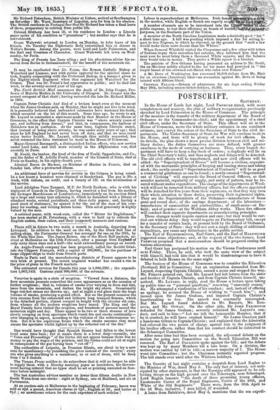POSTSCRIPT.
SATURDAY.
In the House of Lords last night, Lord Pisa:tuns stated, with more completeness and mastery, the plan of military reorganization previously sketched by Lord Palmerston in the House of Commons. The principle of the measure is the transfer of the military department of the Board of Ordnance to the Commander-in-chief; and the appointment of a chief civil officer, under the Secretary of State. This officer will sit in the House of dommons, move the whole military estimates in one combined estimate, and convey the orders of the Secretary of State to the civil de- partments. The Under-Secretary of State for War will continue to alt in the House, and there will be plenty of work for both officers. In its details, the plan shows a more precise division between civil and mi- litary duties ; the duties themselves are more defined, with greater exactness in the mode of carrying on business. Thus, every branch de- partment will have to keep a day-book of orders ; a duplicate will lie on the Chief Secretary's table, and thus neglects and delays will be detected. The old civil officers will be transformed, and new civil officers will be added; the "Superintendent of Stores" will become a civilian, acquaint- ed with the mercantile principles of keeping and issuing stores and taking stock ; the newly-created "Superintendent of Contracts" will be as good a commercial gentleman as can be found ; a newly-created "Superintend- ent of Clothing" will supersede the Board of General Officers, so that sounder material, regularity of supply, and unity of pattern, may be in- sured without undue expenditure. The charge of the departments at Wool- wich will not be removed from military officers, but the officers appointed will be detached for five years from their regiments, so that they may turn their whole attention to these duties, preserving their regimental rights. They are the Superintendents of the Ordnance—manufacture of brass guns and round shot ; of the carriage department ; of the laboratory— manufacture of ammunition and combustibles; of small-arms—at En- field; and of powder—at the Waltham Abbey works. These five officers will conduct their separate departments on manufacturing principles.
These changes would require caution and care ; but they would be car- ried out without delay : they would require no Parliamentary bill, except far a transfer of certain lands, at present held by the Board of Ordnance, to the Secretary of State : they will not cost a single shilling of additional expenditure, nor cause any disturbance in the public service.
1- The Earl of ELLENBOROUGH, Earl Gnus, and the Earl of BARDWICRE suggested some objections; and, at the request of the two former, Lord PANKURE promised that a memorandum should be prepared stating the 'various alterations.
Earl GREY has postponed his motion on the Vienna Conferences until next Friday. Those he said, who took the same view of the subject with himself, had told him that it would be disadvantageous to have it debated in both Houses on the same night.
The business of the House of Commons was to consider the Education (Scotland) Bill in Committee but an explanation demanded from Mr.
Layard, respecting Captain Committee; caused a scene and stopped the way. Mr. Fintous pointed out, that Mr. Layard had left letters from the sister and brother of Captain Christie, and from Captain Christie himself, un- noticed. Mr. LAYARD, in reply, read the House a lecture upon taking up public time on "personal questions," renewing "unseemly scenes," &e. He attempted a vindication of his conduct ; and, instead of offering an apology, he accused the House of wishing to "crush him " ; and turned upon Sir James Graham, and imputed Captain Christie's heartbreaking to him. The speech was constantly interrupted. But Mr. Layard found defenders in Mr. BRIGHT, Mr. Pos- sum, and Mr. °TWAY. On the other side, Sir Joule PARINGTON defended Sir James Graham ; severely criticized Mr. Layard's con- duct, and said to him—" Let me tell the honourable Member, that if he is crushed, he will have crushed himself." Sir bases GRAHAM paid a handsome tribute to Captain Christie ; and explained that the Admiralty had referred the two points of charge against him to the judgment of his brother officers, rather than that his conduct should be submitted to the Sebastopol Committee.
After some time had thus been occupied, the adjourned debate on the motion for going into Committtee on the Scotch Education Bill was resumed. The Earl of DamtErra spoke against the bill; and the debate was kept up by many Members till a late hour. On a division the motion was carried by 149 to 142—a narrow majority of 7. The douse went into Committee ; but the Chairman instantly reported progress. The bill stands over until after the Whitsun holidays.


























 Previous page
Previous page